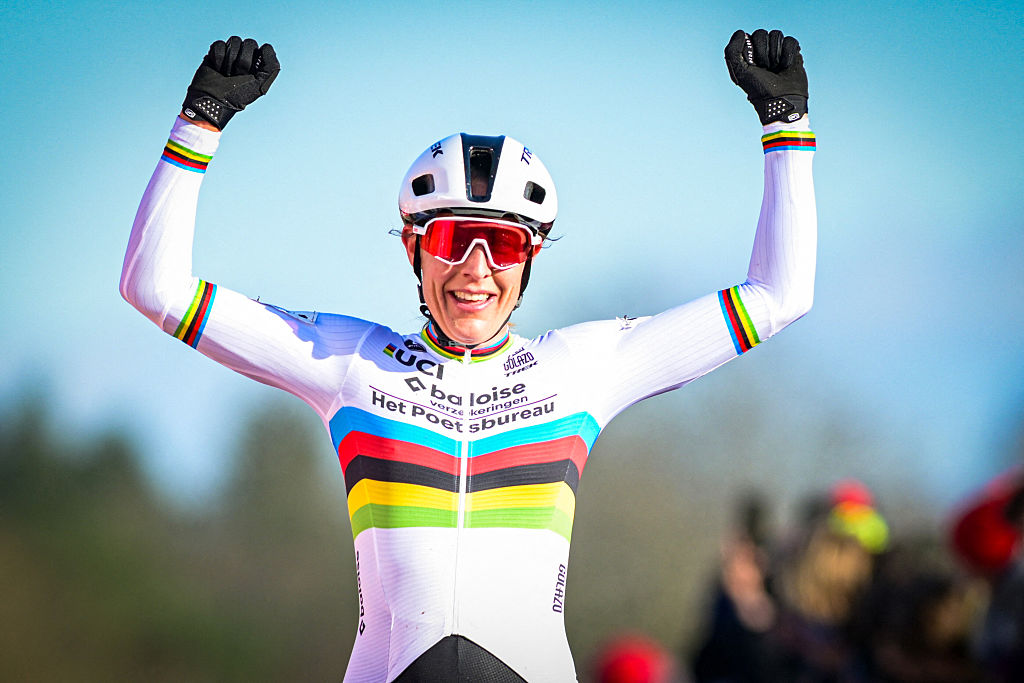Restless Roglic: The world's number-one rider wants more
Procycling interviews the Slovenian ahead of 2020 campaign
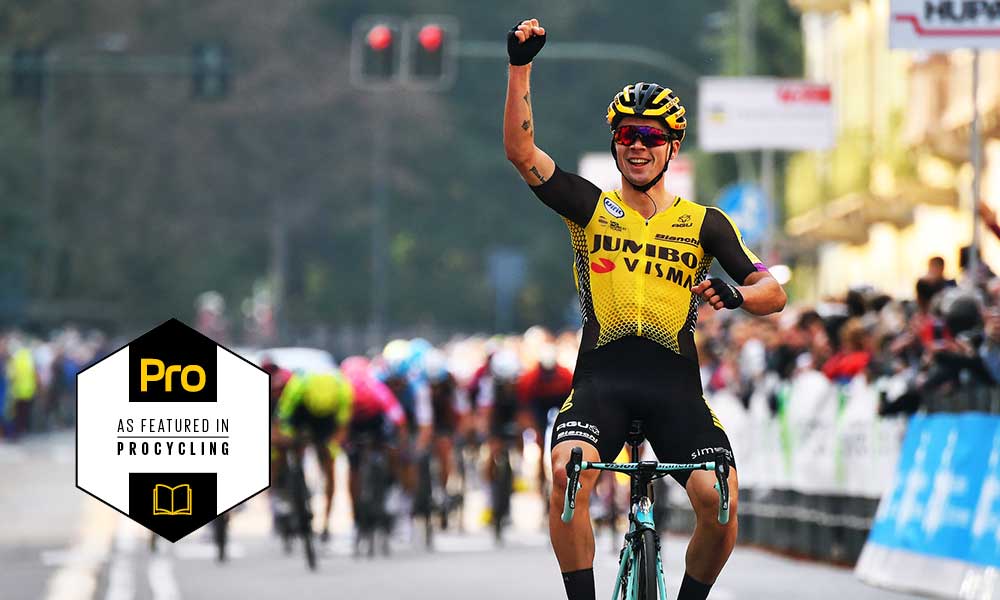
The latest race content, interviews, features, reviews and expert buying guides, direct to your inbox!
You are now subscribed
Your newsletter sign-up was successful
Primož Roglič had a year to remember in 2019. He won his first Grand Tour at the Vuelta a España and ended the season as the number-one ranked male rider. Procycling went to meet the Slovenian, who is finding life is no longer the same.
This article appeared in Procycling magazine issue 263, December 2019.
Primož Roglič is restless. He’s repeatedly picking up and putting down a piece of card he’s been given by Jumbo-Visma for the day, thumbing it between his fingers, before holding it up to his eye-line as he gazes into the distance while he talks. When he’s done with that, he turns to his glass, once he’s drained it of sparkling water, and begins to tap it gently upside down on the table. He then takes two mobile phones out of his pocket and flips them over every now and again between taking quick glances at their screens. He yawns. The end of the season is agonisingly close, and Roglic is as restless as a child on the last day of term.
It’s no wonder Roglič is eager to stop. He started racing in February at the UAE Tour – which he won – and didn’t relent until four days before we meet in late October, at the Chrono des Nations – where he finished third. In between was a Giro d’Italia, where he came third, and a Vuelta a España, which he won, for his first victory in a Grand Tour.
On top of that, the Slovenian achieved a remarkably consistent set of results which saw him finish outside the top 10 only once all year (12th at the World Championships TT in Yorkshire) and featured 13 victories including Tirreno-Adriatico, the Tour de Romandie, Tre Valli Varesine and the Giro dell’Emilia. It was enough to propel Roglič to the number-one spot on the UCI’s male elite rider world ranking.
Still, time isn’t quite for Roglič to do with as he likes, not yet anyway. The yellow card he’s grasping is cut into the shape of a team jersey and has his name printed in bold, black letters on one side.
It lists his hourly schedule for Jumbo-Visma’s end-of-season gathering. Every rider has been given one so they know where to be, and when. We’re in the 1pm to 3pm slot: interviews and meetings with sponsors. Next, there’s a two-hour golf masterclass on the course in the grounds of the Duke Hotel, which is hosting the team. The Duke is a members-only club handily owned by the Van Eerd family, who also happen to own the Jumbo supermarket group, the team’s main sponsors. Golf isn’t really Roglič's thing, and while his team-mates will be enjoying a friendly round in the late afternoon autumn sunshine, before a celebration dinner that kicks off at 7pm, he’d rather go and rest. After today, there’s one more job for Roglic to tick off, a last-minute call-up to the Saitama Criterium which requires a long-haul flight to Japan the next day. Then he can say he’s done.
The latest race content, interviews, features, reviews and expert buying guides, direct to your inbox!
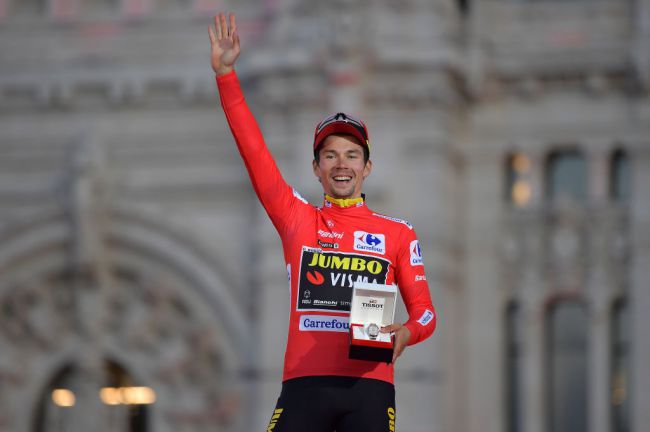
Roglič has been learning the past two seasons that the life of a Grand Tour rider doesn’t stop. Roglič's off-season, if you can call it that, will consist of a few short weeks of time at home in Slovenia, before training and planning start in earnest for next year. Even now, when he should be basking in the success of what he’s achieved in 2019, Roglič is already looking ahead to 2020.
"I look back at a successful season. We won a lot of races and it was really cool," Roglič says. "We now have a lot of talks and meetings, I didn’t even start thinking so much about the new season or whatever, but they forced me here somehow, and I’ve gotten more into the emotion of the new season and the new challenges and looking forward to 2020."
In the past four seasons Roglič has gone from a cycling novice, albeit one with a demonstrably big engine, to Grand Tour stage winner, Grand Tour contender and now Grand Tour winner. This year’s Giro was the first time Roglič had been the sole GC leader of his Dutch team – at the Tour in 2018 when he finished fourth he shared the responsibility with Steven Kruijswijk. Rapid hardly does justice to describing his development - the last time Roglic finished outside the top 10 in a stage race was at Tirreno in 2018 when he finished 29th.
The juxtaposition between his relative maturity in age – he turned 30 in October – combined with his immaturity in cycling has perhaps created the perfect blend; Roglič is hitting the peak of his physical abilities with all the enthusiasm and eagerness of a fresh-faced newbie. The boundaries of what he wants to achieve currently know no end, which becomes immediately apparent when Procycling asks what he thinks about the continuing trend towards fewer time trials in modern Grand Tours (10 of Roglič's 35 career wins so far have come against the clock).
"I don’t consider myself as a time triallist, I don’t like it," he says flatly. "I can do really good, but not in the normal time trials – I’m not really good if it’s 50k flat up and down. There are maybe 30 guys stronger than me, but still, I can do better than 50-kilo climbers.
"I don’t care, actually. I want to be a rider who is able to win a prologue, an up-and-down short time trial, win one-week races, three-week races, one-day races. This is what I want to be."
Roglic the enigma
Roglič's cycling results speak for themselves, but Roglič himself is an enigma. In interviews and post-race media scrums he is stoic, a stereotypically Eastern European strong and silent type who speaks without saying any more than the minimum. At the Vuelta, he took just four questions in the winner’s press conference, much to the chagrin of the reporters, and then said: "I don’t have much to say," when he took the microphone on the winner’s podium in Madrid. The most animated he tends to get is when he pulls his trademark telemark landing pose on the podium – a nod to his ski-jumping background.
Surprisingly, then, and against our expectations, the Roglič we meet is candid, amenable and exhibits a dry sense of humour we hadn’t seen before - even if we can’t always tell if he’s trying to be funny or not. When we ask how physically different he feels this season, he quips, "Now I don’t feel physically really good; I am tired." When a member of Jumbo’s staff comes over to offer Roglič a drink, he shoots back with "beer", before reluctantly changing to a sparkling water. And when our photographer asks what he would do if he had a free day all to himself, he deadpans, "more interviews, more photoshoots".
Roglič is the first to admit that being vocal doesn’t come naturally to him and that adapting into that role was one of the most challenging lessons he had to learn to become a team leader. His rapid ascension and lack of cycling experience compared to some of his teammates and peers exacerbated this, and he calls learning how to communicate effectively with his team his "homework".
"It’s the thing that I had to learn. How to manage all the guys and the team around me. From my side, it happened really fast and the thing is, I’m still not an old guy – I am old with age but not an old guy with a professional career on the bike. So it’s quite hard to be smart and say, ‘You need to do this and this’,” Roglič says.
"I don’t know everything and it’s hard to act like that. I don’t really want to anyway, even when I am the leader. I have to lead the team in a good way, but still make the critical decisions that you need experience for."
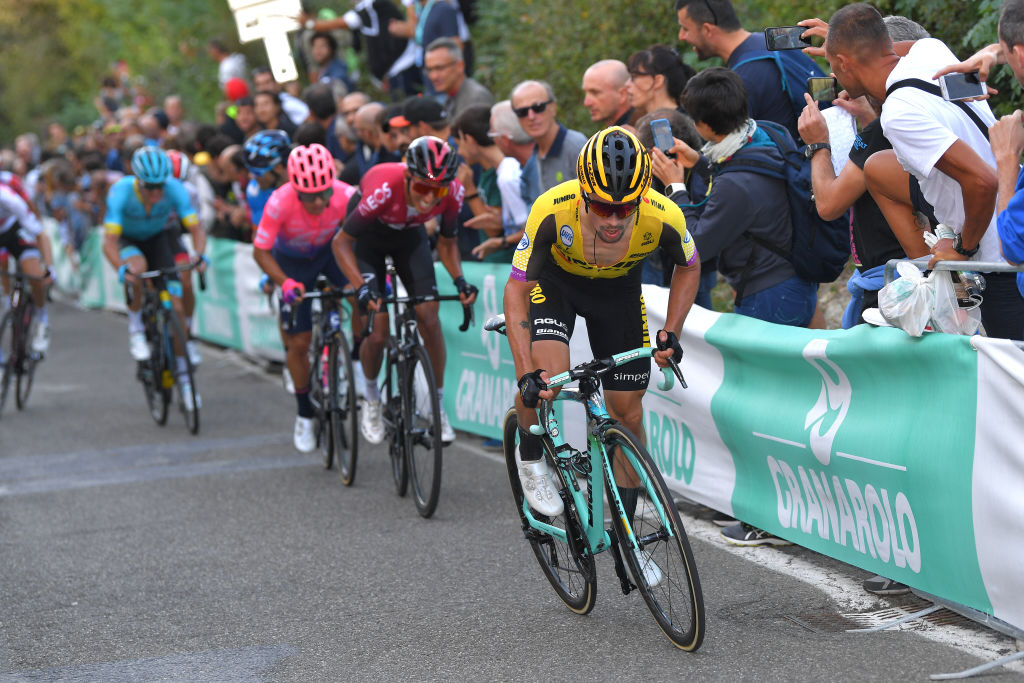
What Roglič may lack in cycling knowhow, he clearly makes up for in determination. It takes a certain type of individual to be a Grand Tour rider, and then even more so to be a successful one. Three-week racing is cycling’s toughest endurance test and there’s far more to it than having only the right physical attributes - riders need to have a mental strength that enables them to push the body’s boundaries. They spend more weeks away from home than at home, hours endlessly training, often in solitary conditions - a factor that’s magnified by the fact that the margins between the top riders are increasingly getting smaller.
Finding that extra one per cent is often all it comes down to. Many riders find it isolating. Plenty completely let loose in the off-season because finally they can, indulging a lot, quickly, to make up for the months of living like a monk. Bradley Wiggins, on his roadshow tour this year, said of his time at Team Sky when he was the squad’s sole GC leader, "there was no enjoyment. It was a brutal elite sport," before calling it some of the most unhappy times of his career.
So what motivates Roglič to push himself that bit further, to dig that bit deeper, every day? "On the bike, it’s cool, it’s nice when you can ride faster, when you suffer a little less. But it’s never enough, it’s never fast enough," he says. "You’re always looking to be better and better. You don’t suffer less at the end nor does it get easier; you just go faster."
You get the impression cycling is first and foremost Roglič's job. He quit ski jumping when he realised he could no longer become the world’s best in the way he’d dreamed of. Instead, he took up cycling, and has that same mentality: to be the best. He doesn’t have a deep-rooted passion for cycling - he knew next to nothing about road racing, or its history, when he started riding in 2012 - but when he realised he possessed the physical attributes to do well, he threw himself into cycling entirely.
"For me, it’s just nice if I am able to win the races. I do, I don’t know, 110 per cent with everything in that moment when it’s necessary at altitude camps when I am away from home, to be the best," he says. "It’s just some extra motivation you have with your wife and kid at home, to really make them proud or, I don’t know, young kids who are sitting on the bike and they say, ‘Fuck, I want to be like him'."
Still, Roglič acknowledges that having the right mentality is typically what Grand Tour racing comes down to: the ability to keep going, to not give up, when his body and mind are screaming at him to stop. "We are humans. Mental strength is one of the most important things to have. It’s a fight against yourself, actually," he says.
'You have to be the best'
Considering Roglič has been living as a professional athlete in one way or another since he was a teenager, the biggest adjustment he’s had to come to terms with isn’t adapting to the sacrifices being a number-one cyclist requires. Rather, this past year particularly he’s learned that with success comes demand, and the more Roglič wins, the more people want a piece of him.
At home in Slovenia, the level of fame is intensified for the simple fact that Roglič is blazing a trail and making cycling history there. In a country that’s already sports mad – basketball, handball and football are up there with ski jumping as the nation’s most popular sports - he’s turning the public to cycling in a way no athlete there has done before. When he returned home to Zagorje ob Savi, down the road from Trboblje, where he was born, after his Vuelta victory he was greeted with a hero’s welcome by masses of crowds.
That precious time that Roglič once had to himself and wants to spend with his family who he’s away from much of the year - his son was born this June – is no longer entirely his. It’s clearly been a challenge he’s been forced to get used to, whether he likes it or not.
"When you are at home, everybody knows it and everybody wants to be you. You lose your private life. Everything that you had before, or you didn’t even notice you had, now you don’t have it. Now you just come home and you sleep there and that’s it," Roglič says.
"In Slovenia, it’s crazy. It’s nothing bad, they don’t throw eggs at me or anything, but it just takes time, you know what I mean? Even if I go to the shop it takes time. Even if I do a small ride, I have to stop five times. It takes time. At the end, you want to have as much quality time as possible. You don’t think about these aspects of being the top athlete or being the best."
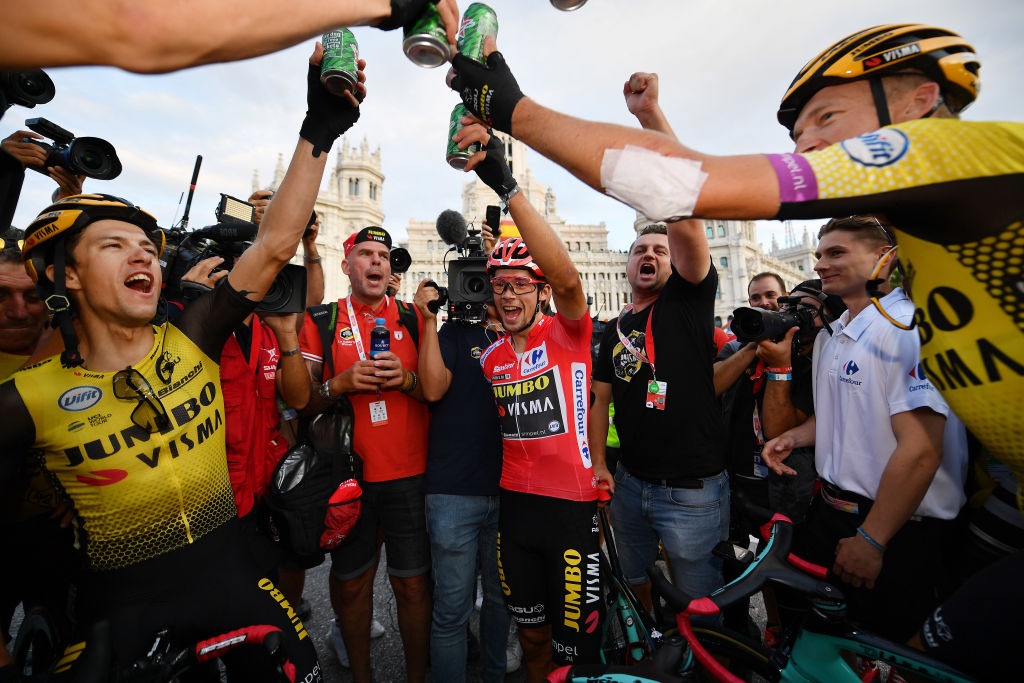
Things could get even bigger next year if Roglič lines up at the Tour as one of the potential winners. Public interest would hit the stratosphere in Slovenia, you imagine, if he were to go on and win it, as he one day dreams of doing.
"Of course I want to win the Tour. It’s the biggest race that you can win," he matter-of-factly says.
He’s finished fourth there before, and has a Grand Tour win on his palmarès, so a full-on tilt at the Tour seems like Roglič's next natural step. Yet the arrival of Tom Dumoulin at Jumbo-Visma next year complicates matters, with Dumoulin already stating that if the route suited him the team have said they want him to start. Roglič won’t be drawn into a face-off with his future teammate though, and says the Dutchman’s arrival is a benefit, not a hindrance. Just as Ineos and Sky previously balanced Geraint Thomas, Chris Froome and Egan Bernal’s ambitions, Roglic diplomatically says if both riders were to start, the road will eventually decide who is number one.
"The stronger guys you have, the stronger the team is, and the more guys who believe they can win the Tour, the better they can prepare for the Tour, the better they will come in the Tour," Roglič says.
"The road, sooner or later, will tell where your place is."
Besides, Roglič says he’s seen little of the 2020 route yet, other than knowing that the stage 20 time trial up La Planche des Belles Filles is a stage he "can win".
Whatever happens next season, there’s no getting away from the fact that Roglič's 2019 performances mean he will line up at almost every race he starts as a favourite. To others that might be a burden, but for Roglič, the target on his back is further motivation to keep pushing. "I like it. You have to fight for it, you have to earn it," he says. "It’s always the same, when you want to win, you have to be the best."
Before that, however, it’s time for Roglič to get some well-earned rest.
Procycling magazine: the best writing and photography from inside the world’s toughest sport. Pick up your copy now in all good newsagents and supermarkets, or get a Procycling print or digital subscription, and never miss an issue.
Follow @Procycling_magazine
Sophie Hurcom is Procycling’s deputy editor. She joined the magazine in 2017, after working at Cycling Weekly where she started on work experience before becoming a sub editor, and then news and features writer. Prior to that, she graduated from City University London with a Masters degree in magazine journalism. Sophie has since reported from races all over the world, including multiple Tours de France, where she was thrown in at the deep end by making her race debut in 2014 on the stage that Chris Froome crashed out on the Roubaix cobbles.
